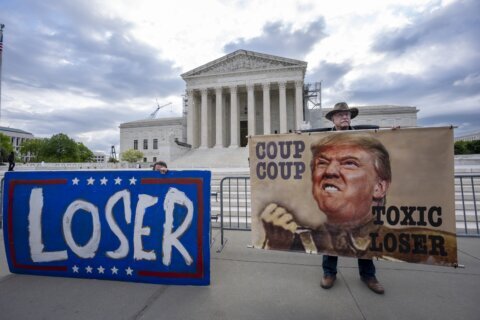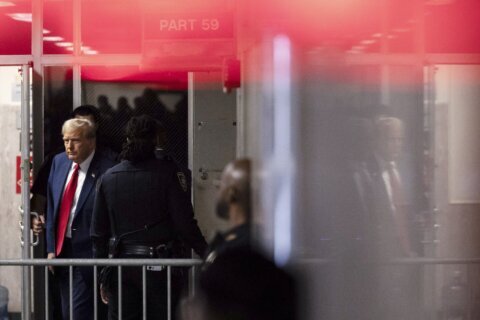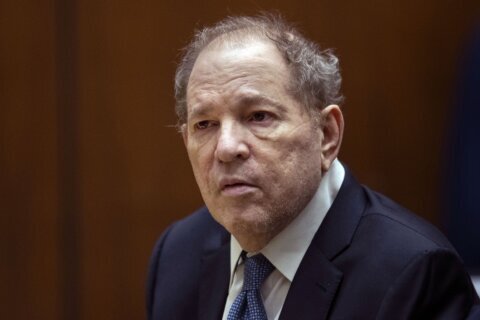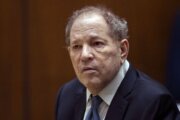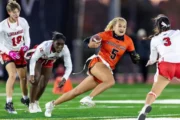CLEVELAND (AP) — (EDITOR’S NOTE: Hall of Famer Wayne Embry, a five-time NBA All-Star and the first African American general manager in sports when the Milwaukee Bucks named him to that position in 1972, shares some of his experiences of playing in the league during the 1960s. The demand for Civil Rights and the Vietnam War were among the issues dividing the country and the foundation was being formed in the NBA that league and players stand on today.)
The Sixties were a turbulent time in our country –- and in the NBA –- as the battle for Civil Rights raged.
That battle reached my hotel room in Philadelphia in the spring of 1965, when my wife Terri called from Cincinnati to tell me she and Oscar Robertson’s wife Yvonne were going to join Dr. Martin Luther King’s march from Selma to Montgomery.
“Are you crazy?” I asked. This was less than two weeks after Bloody Sunday, when Alabama state troopers on horseback attacked the nonviolent marchers with tear gas, clubs and dogs after they crossed the Edmund Pettus Bridge in Selma.
Of course, I admired their courage and sympathized with the cause. But league executives made it clear they didn’t want us to get involved and insecurity about our jobs kept us sidelined – and glued to the television.
What a wonder 55 years later to watch with pride as NBA players not only participated in but led marches in the protests that erupted after the murder of George Floyd by a Minneapolis police officer. The Milwaukee Bucks, upset over the shooting of African-American Jacob Blake by a white police officer in nearby Kenosha, Wisconsin, were ready to boycott a first-round playoff game and with five other teams ready to join the boycott, the league postponed all the games in support.
But things were so different in the NBA in the 1960s. The league was so insignificant that my aspiration was to play for the Harlem Globetrotters –- or go to business school. I wasn’t sure there was a place for me in the NBA. If not for Joe Lapchick, the first coach of the New York Knicks. He pulled me aside at a college All-Star game, gave me insight about the league and told me I could have a bright future in the NBA.
In 1958, I was drafted by the St. Louis Hawks, who had no Black players, and was almost immediately traded to the Cincinnati Royals, who had one – Si Green. And he was traded on opening night, leaving me as the only Black until Oscar arrived two years later. My first contract was for $6,300 a year – not guaranteed – which I signed without hesitation.
There were rumors of a quota system in the league — and I can tell you the rumors were true. Veteran Earl Lloyd, the first African American to play a game in the league, once told me to always play my best so my team couldn’t cut me.
The league consisted of eight teams, with 10 players each. We often drove to road games, three or four of us packed into the car. Back then, there still were hotels who wouldn’t house Black players or restaurants that wouldn’t serve us. Often, when playing in Boston, we would eat at Bill Russell’s house. In other cities, we’d have dinner at the homes of other Black players, or get recommendations where we could eat.
After the initial efforts of Lapchick to integrate what would become the NBA were thwarted in 1947, progress was being made in the 1960s.
The Celtics started five black players, and Russell became the first Black coach in the league. My Royals were providing a beautiful illustration of race relations every day when the white Jack Twyman and his family became the primary caregivers for Black teammate Maurice Stokes, a powerful player cut down by a traumatic brain injury suffered in a fall during a game. He emerged from a coma paralyzed and unable to speak. Twyman and Stokes were an inseparable example of love and friendship.
We had all learned things from the nonviolent movement going on around us, and we put them to good use before the 1964 All-Star Game in Boston – the first to be nationally televised. At a players’ only meeting called by Boston’s Tommy Heinsohn, we voted not to play the game unless the owners recognized our newly formed union.
After some tense moments as tipoff approached, the owners finally agreed. Our bold move established a path for the future that benefited players and owners.
Progress was being made in the country, too, with the passage of the Civil Rights Act in 1964. We thought that might help ease the pain in the wake of the assassination of President John Kennedy in 1963, but not even five years later King was assassinated, as was Kennedy’s brother Robert, the former attorney general who was running for president in 1968.
By then, I was playing for the Celtics, who were en route to the 1968 NBA championship. After King’s assassination in April, riots broke out again. As players, we were inclined not to play out of respect for Dr. King. But word came down from the league office that the mayors of Boston and Philadelphia (our opponent in the Eastern Division Finals) were pleading for us to play in an effort to keep people home and off the streets. So we played that game and postponed the next one, resuming the playoffs after Dr. King’s funeral.
After winning the NBA title in 1968, I was selected by Milwaukee in the expansion draft, played one season and retired. My salary that season went to $40,000 – almost seven times more than my first season. There had been so many changes in the league and out, on the court and off, progress and setbacks. The next decade would bring new challenges – and new celebrations – for me, the league and the country.
___
Wayne Embry was the NBA Executive of the Year in 1992 and 1998. The 6-foot-8 forward/center was named to the Hall of Fame in 1999. Since 2004, the 84-year-old Embry has been the Senior Basketball Adviser for the Toronto Raptors.
___
More on the NBA At 75: https://apnews.com/hub/nba-at-75
___
More AP NBA: https://apnews.com/hub/NBA and https://twitter.com/AP_Sports
Copyright © 2024 The Associated Press. All rights reserved. This material may not be published, broadcast, written or redistributed.

